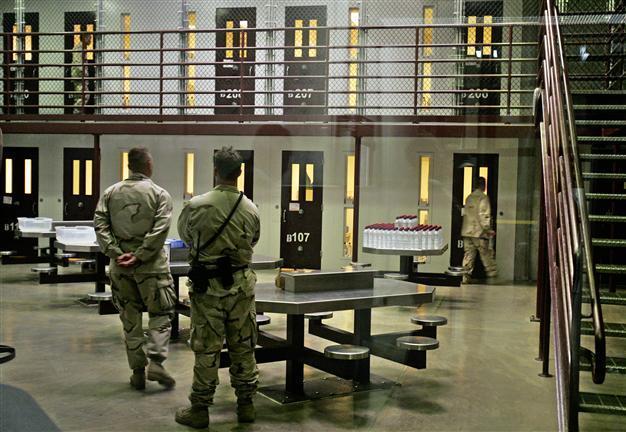Clash over hunger strike at Guantanamo Bay
MIAMI - The Associated Press

In this Oct. 9, 2007 file photo, Guantanamo guards keep watch over a cell block with detainees in Camp 6 maximum-security facility, at Guantanamo Bay U.S. Naval Base, Cuba. AP photo
Guards clashed Saturday with prisoners at the Guantanamo Bay prison as the military sought to move hunger strikers out of a communal section of the detention center on the U.S. base in Cuba, officials said.
The confrontation occurred after the commander decided to move prisoners into single, solid-walled cells so that prison authorities could monitor them more closely during the hunger strike, the military said.
When guards arrived in the communal to move the men, the prisoners fought back with makeshift weapons, prompting troops to fire four "less-than-lethal rounds" to quell the disturbance, according to a statement issued by Miami-based U.S. Southern Command, which oversees the prison. There were no major injuries, military officials said.
"I know for sure that one detainee was hit but the injuries were minor, just some bruises," said Army Col. Greg Julian, a Southern Command spokesman.
Guards used a modified shotgun shell that fires small rubber pellets as well as type of bean-bag projectile, Julian said.
The clash occurred in Camp 6, which the military converted to a mostly communal section for well-behaved prisoners, giving them access to satellite television, language and other classes and round-the-clock recreation time to make Guantanamo conform to international standards for a prisoner-of-war camp.
"This is exactly the opposite of what they should be doing," said Carlos Warner, a federal public defender in Ohio who represents several prisoners held at Guantanamo. "The military is escalating the conflict."
Tensions had been high for months in Camp 6 and the adjacent Camp 5, where all the prisoners are held in solid-walled, single cells. Lawyers for prisoners said a hunger strike broke out Feb. 6 in protest their indefinite confinement and what the men believed were tighter restrictions and intrusive searches of their Qurans for contraband. Prisoners had offered to give up the Muslim holy book that each one is issued by the government but prison officials refused to accept them, which they considered a tacit admission of wrongdoing.
The prison at the U.S. base in Cuba holds 166 detainees. The military said that as of Friday 43 prisoners were classified as hunger strikers, including nearly a dozen being force fed to prevent them from starving to death. Lawyers for prisoners have insisted the strike is much more widespread and that almost all of the men are refusing to eat.
For several weeks, prisoners in the communal section had been covering up security cameras and windows used by the guards to monitor them, one of the reasons the commander decided to move them into single cells.
Officials were also concerned that some men were surreptitiously starving themselves to avoid being classified as a hunger striker and force fed. The military said it was conducting individual assessments of all the prisoners.
